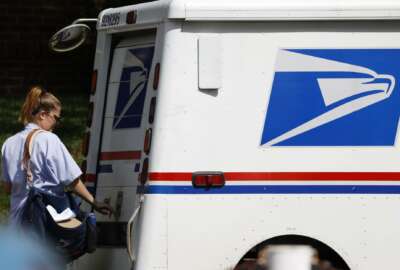The Postal Service expects electric vehicles will make up about 10% of its next-generation fleet of delivery trucks, but a group of 17 House Democrats has introduced legislation that would set higher aspirations for the agency to move off fossil fuels.
The Postal Vehicle Modernization Act, led by Rep. Jared Huffman (D-Calif.), a member of the House Transportation and Infrastructure Committee, would give USPS $6 billion to replace more of its decades-old Grumman Long Life Vehicles with electric or zero-emission delivery trucks.
The bill requires USPS to guarantee that at least 75% of its new fleet will be electric or zero-emission delivery trucks. By 2029, the bill requires USPS to make at least half of its medium and heavy-duty vehicles electric or zero-emission.
By 2040, the bill prohibits USPS from purchasing any medium and heavy-duty vehicles that aren’t electric or zero-emission.
Postmaster General Louis DeJoy told the House Oversight and Reform Committee in February that USPS currently plans to make 10% of its next-generation vehicle fleet electric, but the agency has a year to finalize the prevalence of electric vehicles in its next-generation fleet.
DeJoy told lawmakers USPS didn’t plan on buying more electric vehicles because of the cost, and said the agency would need $3-4 billion to order more.
“We’re very happy to talk with the administration and with this Congress, if they want to help us,” DeJoy said.
Rep. Jimmy Gomez (D-Calif.) urged DeJoy to “take a harder look on what kind of fleet you’re going to be using,” and signaled a willingness to give USPS funding to purchase more electric vehicles.
“I just want to be very clear that Congress is going to be supportive of trying to get electric vehicles in the Postal Service loop, and we also understand that it’s part infrastructure and we can take that into consideration when we allocate resources,” Gomez said.
USPS spokesman Dave Partenheimer said in a statement that the Postal Service welcomes support from Congress to help the agency advance its goal of a zero-emission vehicle fleet.
“With the right level of support, the majority of the Postal Service’s fleet can be electric by the end of the decade,” Partenheimer said.
USPS awarded its next-generation vehicle contract to Oshkosh Defense last month, and expects to see the first new vehicles to arrive on delivery routes by 2023.
Two other companies made the shortlist for the contract award. The vendor Workhorse proposed manufacturing only electric delivery vehicles for USPS, and has met with postal executives following the contract award.
The contract award to Oshkosh Defense caps a six-year process drawn out even longer by the COVID-19 pandemic.
While USPS said next-generation internal combustion vehicles produced by Oshkosh Defense can be retrofitted to become electric, members of the oversight committee told DeJoy that the contract award didn’t set an ambitious enough goal.
President Joe Biden signed an executive order last month directing all federal agencies — including the Postal Service — to move toward “clean and zero-emission vehicles.” A National Climate Task Force led by the heads of most Cabinet-level agencies would oversee this transition.
Huffman, in a press release introducing the bill, said USPS is “squandering” the opportunity to save on long-term transportation costs and become a more efficient agency.
“By investing in modern, efficient vehicles we can transform the USPS into a global leader in efficiency and innovation, helping revitalize the beleaguered Postal Service and saving taxpayers billions of dollars each year. With this funding, there is no valid reason not to move forward with completely electrifying the USPS vehicle fleet,” Huffman said.
The bill would also require USPS to provide at least one charging station at each public postal facility by January 2026, and require the agency to provide charging stations at USPS vehicle housing facilities.
Rep. Jackie Speier (D-Calif.), a co-sponsor of the bill, cited a General Services Administration analysis showing that the lifetime cost of electric vehicles versus those with internal combustion engines was about equal.
Electric vehicles, she added, would continue to become more cost-efficient as the batteries that power them decrease in price.
DeJoy, however, expressed skepticism with the cost estimates, saying USPS would need to invest significantly in charging stations across its nationwide delivery network.
“The cost per truck is a little misleading because it’s really the cost of infrastructure, the electric infrastructure around the nation that we would need to implement,” DeJoy said.
A House resolution introduced Tuesday by Huffman, and Reps. Marcy Kaptur (D-Ohio). and Rep. Tim Ryan (D-Ohio) would freeze USPS’s contract with Oshkosh Defense amid a review to determine whether the award is “consistent with the federal obligations” in Biden’s executive order.
Copyright
© 2024 Federal News Network. All rights reserved. This website is not intended for users located within the European Economic Area.

